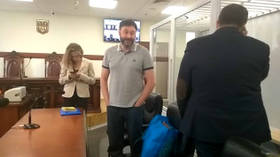Ukrainian court releases Russian journalist Vyshinsky on personal recognizance

Russian journalist Kirill Vyshinsky pledged that he will attend court hearings upon first demand as he was released from a Ukrainian prison on personal recognizance.
Vyshinsky’s legal team had earlier asked the court to allow him to stand trial without remaining behind bars. The prosecution has agreed to this.
The journalist said he has no intention of hiding and promised to faithfully attend future hearings. He said that the charges against him are “so absurd that it’s in my interest to prove… their nonsensical nature” in court.
As I said before, I’m ready to attend the court hearings and participate in the trial, without delaying it or avoiding the court sessions.
The journalist was arrested in May 2018 when he was the chief of RIA Novosti Ukraine. He was being held on treason charges. Prosecutors claim that he had backed the self-proclaimed republics of Donetsk and Lugansk (DPR and LPR) in the east of Ukraine. Vyshinsky denied the charges, insisting that he covered the positions of both sides of the conflict. If proven guilty, he could face up to 15 years in prison.
Last month, Ukrainian President Volodymyr Zelensky proposed swapping the journalist for Ukrainian filmmaker Oleg Sentsov, who is serving a 20-year jail sentence in Russia after being convicted of plotting terrorist attacks in Crimea.
During a hearing on Wednesday, Vyshinsky said he will not participate in any prisoner swaps. “I rejected being swapped a long time ago, and stand by my position,” he stressed.
Also on rt.com Kiev offers to swap detained Russian journalist Vyshinsky for terrorism convict SentsovThe defendant has long maintained that the case against him amounts to political persecution. He claimed in court that the charges against him were launched to boost the low approval rating of previous president Petro Poroshenko. Poroshenko lost the presidency to Zelensky in April.
Vyshinsky expressed hope that the court will continue to make fair decisions, “which reflect reality” and not be affected by “political pressure.”
Personal recognizance means that a court can impose travel restrictions on a defendant and limit his contacts with certain people.
Think your friends would be interested? Share this story!












